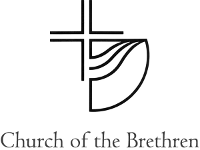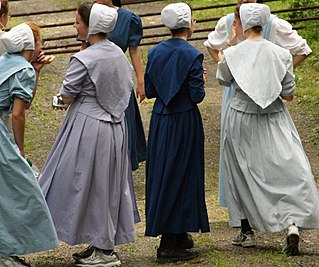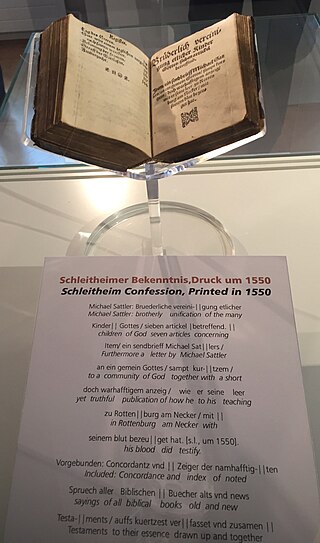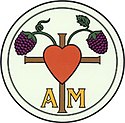Anabaptism is a Christian movement which traces its origins to the Radical Reformation in the 16th century. Anabaptists believe that baptism is valid only when candidates freely confess their faith in Christ and request to be baptized. Commonly referred to as believer's baptism, it is opposed to baptism of infants, who are not able to make a conscious decision to be baptized.

The Church of the Brethren is an Anabaptist Christian denomination in the Schwarzenau Brethren tradition that was organized in 1708 by Alexander Mack in Schwarzenau, Germany during the Radical Pietist revival. The denomination holds the New Testament as its only creed. Historically, the church has taken a strong stance for nonresistance or Christian pacifism—it is one of the three historic peace churches, alongside the Mennonites and Quakers. Distinctive practices include believer's baptism by forward trine immersion; a threefold love feast consisting of feet washing, a fellowship meal, and communion; anointing for healing; and the holy kiss. Its headquarters are in Elgin, Illinois, United States.

Plain people are Christian groups in the United States, characterized by separation from the world and by simple living, including plain dressing in modest clothing. Many plain people have an Anabaptist background. These denominations are largely of German, Swiss German and Dutch ancestry, though people of diverse backgrounds have been incorporated into them. Conservative Friends are traditional Quakers who are also considered plain people; they come from a variety of different ethnic backgrounds.

The Old German Baptist Brethren (OGBB) is a Schwarzenau Brethren denomination of Anabaptist Christianity.

The Schwarzenau Brethren, the German Baptist Brethren, Dunkers, Dunkards, Tunkers, or sometimes simply called the German Baptists, are an Anabaptist group that dissented from Roman Catholic, Lutheran and Reformed European state churches during the 17th and 18th centuries. German Baptist Brethren emerged in some German-speaking states in western and southwestern parts of the Holy Roman Empire as a result of the Radical Pietist revival movement of the late 17th and early 18th centuries.

The Church of God (New Dunkers) was a religious group that was formed in 1848 by dissidents of the Schwarzenau Brethren (now known as Church of the Brethren).

The Dunkard Brethren Church is a Conservative Anabaptist denomination of the Schwarzenau Brethren tradition, which organized in 1926 when they withdrew from the Church of the Brethren in the United States.

The Old Order River Brethren are a River Brethren denomination of Anabaptist Christianity with roots in the Radical Pietist movement. As their name indicates, they are Old Order Anabaptists.

Anabaptist theology, also known as Anabaptist doctrine, is a theological tradition reflecting the doctrine of the Anabaptist Churches. The major branches of Anabaptist Christianity agree on core doctrines but have nuances in practice. While the adherence to doctrine is important in Anabaptist Christianity, living righteously is stressed to a greater degree.

Carl Bowman is an American sociologist, who is widely recognized for his studies of Anabaptist religious groups and is perhaps the foremost expert on the social and cultural history of the Church of the Brethren.

An ordinance is a term used by certain Christian denominations for a religious ritual that was instituted by Jesus for Christians to observe.

Alexander Mack was a German clergyman and the leader and first minister of the Schwarzenau Brethren in the Schwarzenau, Wittgenstein, community of modern-day Bad Berleburg, North Rhine-Westphalia, Germany. Mack founded the Brethren along with seven other Radical Pietists in Schwarzenau in 1708. Mack and the rest of the early Brethren emigrated to the United States in the mid-18th century, where he continued to minister to the Brethren community until his death.

The Old Brethren German Baptists, also called Leedyites, are the most conservative group of Schwarzenau Brethren. They live in Indiana and Missouri.

The Old Brethren Church is a Schwarzenau Brethren denomination in the Anabaptist tradition of Christianity. They are a believer's church made up of those who voluntarily choose to follow Jesus as His disciples, and are baptized at this time, during their teen or adult years.
A Seeker is a person likely to join an Old Order Anabaptist community, like the Amish, the Old Order Mennonites, the Hutterites, the Old Order Schwarzenau Brethren or the Old Order River Brethren. Among the 500,000 members of such communities in the United States there are only an estimated 1,200 to 1,300 outsiders who have joined them.
Old Order Brethren are Old Order plain groups of the Schwarzenau Brethren, as well as the River Brethren—both Anabaptist Christian traditions. There are five of these “Old Order” groups of the Schwarzenau Brethren:

Old Order Anabaptism encompasses those groups which have preserved the old ways of Anabaptist Christian religion and lifestyle.
Charity Ministries, also called Charity Christian Fellowship, is a Conservative Anabaptist network of churches that was formed in 1982 in Lancaster County, Pennsylvania.

Samuel Kinsey was a Christian minister and leader of the reactionary wing of the German Baptist Brethren that became the Old German Baptist Brethren.
The believers' Church is a theological doctrine of Evangelical Christianity which teaches that one becomes a member of the Church by new birth and profession of faith. Adherence to this doctrine is a common defining feature of an Evangelical Christian church.








